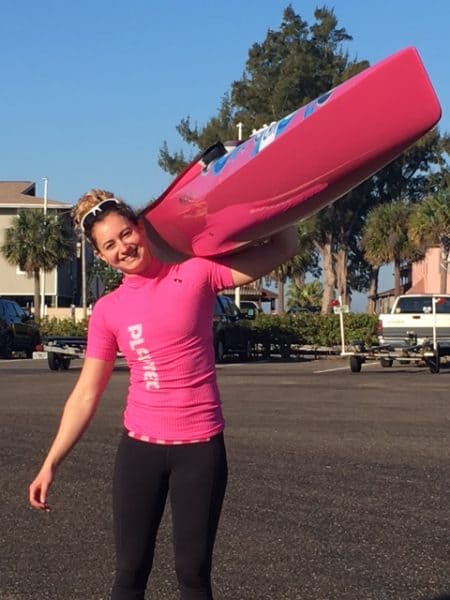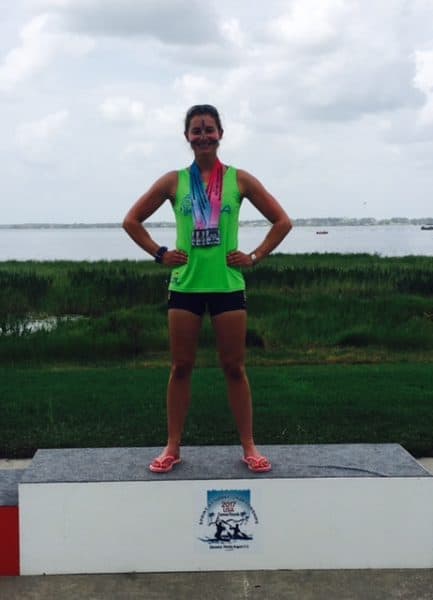Being born deaf has never stopped Caroline C. from achieving her dreams of being an athlete. See how Caroline, who is a bilateral Cochlear Implant recipient, is currently doing in the sport of sprint kayaking and about her Olympic aspirations:
 “I am a sprint kayaker from Toronto, Canada. A sprint kayak is a long (17 feet) skinny boat that is only as wide as my hips, so it’s very tippy. It takes years of practice to be able to paddle in my kayak without falling into the water. The goal in sprint kayak is to race the boat from start to finish down the racecourse as fast as possible. I have been paddling in Toronto with the Balmy Beach Canoe Club for the past 16 years. Did I mention I was born profoundly deaf and wear two cochlear implants?
“I am a sprint kayaker from Toronto, Canada. A sprint kayak is a long (17 feet) skinny boat that is only as wide as my hips, so it’s very tippy. It takes years of practice to be able to paddle in my kayak without falling into the water. The goal in sprint kayak is to race the boat from start to finish down the racecourse as fast as possible. I have been paddling in Toronto with the Balmy Beach Canoe Club for the past 16 years. Did I mention I was born profoundly deaf and wear two cochlear implants?
I started sprint kayaking when I was 10 years old and fell in love with it. I love the feeling of being on the water, the way my boat glides and the scenery around me is beautiful. Nothing clears my head like paddling on the lake does.
When I was younger and wore hearing aids, I used to take them off while I paddled so they wouldn’t get wet. Eventually I got super fancy waterproof hearing aids that had horrible sound quality but gave me enough hearing to understand things like ‘go’ and ‘paddle faster.’ My whole life I’d been asked if I wanted a cochlear implant but always refused because I thought it meant I would have to give up paddling because the sound processor (the external piece) couldn’t get wet.
One day at school my itinerant teacher for the deaf and hard of hearing told me that Cochlear had come out with a new, water-resistant sound processor*. I decided to give Cochlear a chance and went through with the surgery at age 17. I loved my first cochlear implant, so much that I got a second one.
Before my cochlear implants I struggled to hear the start of a race and all the talking that came before it. When racing there are a lot of instructions given to paddlers on the water by referees and starters. Before a race you can expect to hear ‘starter has the race… move your boats up to the start line… three minutes to start… if you don’t back your boat down you will be disqualified.’ I have almost been disqualified a few times for not hearing THAT important piece of instruction.
I even had my coach standing on the shore waving her arm down for the start of a race. When I wore hearing aids, I could catch maybe one sentence out of 10 that were spoken to me. It was a very stressful experience for me, and I always found myself missing the start of a race and playing catch up the rest of the way. With my Nucleus® 6 Sound Processors, I can hear the referees and starters loud and clear; well, megaphones can be a little challenging (but I think that applies to everyone).
At the beginning of August, I competed in Clermont, Florida at the US Sprint Canoe and Kayak National Championships. I went there representing a club from Hawaii called IKAIKA. I trained in Hawaii recently where I fell in love with the club, and they adopted me as one of their paddlers. Their head coach is a two-time Olympian from Australia, and I love training with her.
At Nationals I competed in K1 (kayak for one person), K2 (kayak for two people) and K4 (you should understand the pattern by now). I came home with four medals. Silver in K1 200m, bronze in K1 500m, K1 1000m and K4 500m.
At the end of August, I competed at the Canadian Sprint Canoe and Kayak National Championships where I won a Silver medal in the Junior Ladies Warcanoe event. The warcanoe is a distinctly Canadian event where 14 paddlers squeeze into a boat that looks like a very big canoe with one person standing at the back steering. It’s a fun event and a real team experience.
Both Nationals were fun events this summer but my dream is to compete at the Olympics.
This fall my focus is on training hard in the weight room to get stronger. I will also be cranking out the kilometres paddling, running and on the rowing machine to train my cardiovascular system. In the winter, I will go to Hawaii to train in kayak because it will be too cold in Canada.
I look forward to accomplishing my dreams thanks to the help of my cochlear implants.”
If you have a child with hearing loss and you’re looking for treatment options to help them hear, visit IWantYouToHear.com.
If you’re an adult in hearing aids and looking for other options to help you hear, consider cochlear implants and find more information here.

